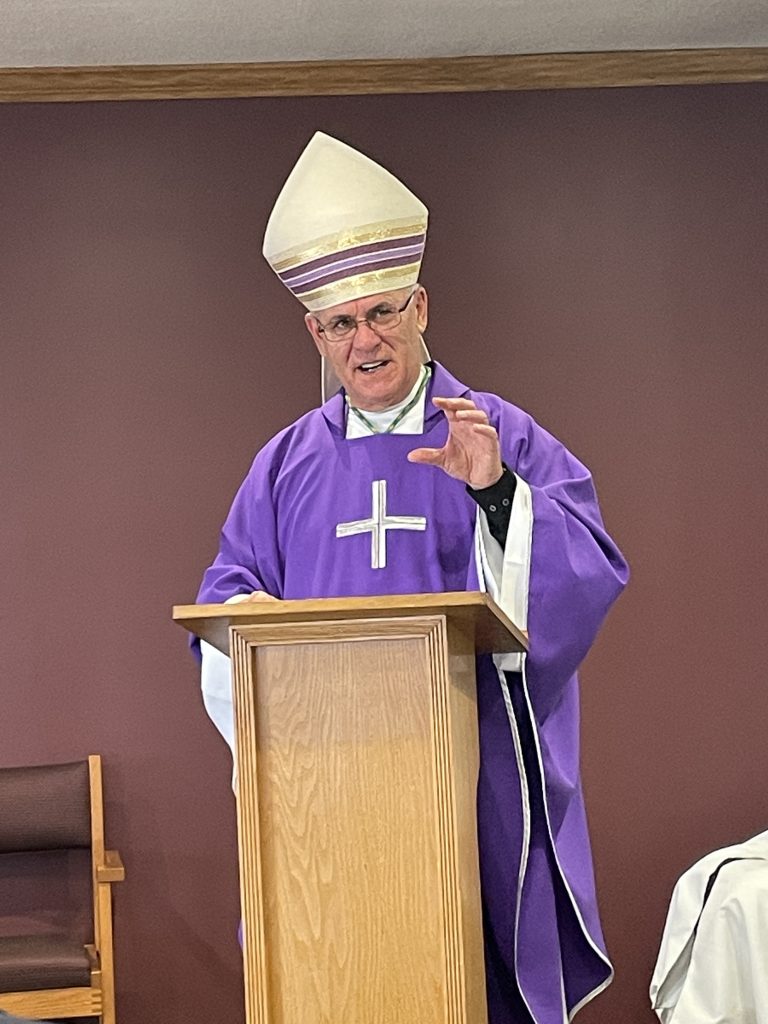March 21, 2023 // Diocese
Catholic Charities Century Club Supporters Gather for Mass and Honored for Giving
As part of the celebration of 100-years in existence, officials with Catholic Charities of the Diocese of Fort Wayne-South Bend asked donors to become members of the Century Club by donating a minimum of $1,000 to the nonprofit organization in 2022.
On Saturday, March 18, a special Mass, brunch, and presentation were held to honor those members of the Century Club and to highlight for them some of the programs their money supports.
The morning began with Mass celebrated by Bishop Rhoades in the Spiritual Center at St. Vincent de Paul Catholic Church in Fort Wayne. Mass was followed by brunch and a presentation at the Life Center on campus.
Catholic Charities Chief Executive Officer Dan Florin thanked everyone in attendance for their generosity and let them know that their names will be engraved on a special memorial plaque that will soon be placed in the lobby of Catholic Charities in the Archbishop Noll Center in downtown Fort Wayne.
Florin then discussed the strategic framework of Catholic Charities that involve the four strategic pillars, which are Guided by Christ, Hope for All, Power of a Hand Up, and A Donation with Impact, and the four strategic priorities, which are Build a Strong Catholic Culture, Transform Lives with Program Excellence, Fuel the Mission and Operate Efficiently, and Be a Trusted Partner.
To explain the major areas where donations to Catholic Charities are used, Florin highlighted the four main categories of services offered and then broke them down.
Stability Services include financial and material support, food pantries, and homeless services. Migration Services involve refugee settlement and immigration. Counseling services include mental health counseling, school counseling, and addiction outpatient therapy. Pro-Life Services involve pregnancy services, parenting services, and adoption record services.
There are many more services offered by Catholic Charities, which can be found at their website at ccfwsb.org.
Florin closed the presentation by once again thanking those in attendance and asking for their continued support as the number of people in need continues to grow.
Bishop Rhoades then also thanked everyone and prayed over the group.
The following homily was delivered by Bishop Rhoades during the Mass for Catholic Charities Donors at St. Vincent de Paul in Fort Wayne on Saturday, March 18:
We are midway through the Lenten season and I hope you are having a good Lent thus far. The readings today are perfect for us to reflect upon our Lenten journey. They really get to the heart of what this holy season is all about.
I invite you to reflect on God’s word to the prophet Hosea in our first reading today: “For it is love that I desire, not sacrifice, and knowledge of God rather than burnt offerings.” Perhaps you noticed that we recited these words in the Responsorial Psalm today: “It is mercy I desire, and not sacrifice.” They are both quotes from Hosea, however, the quote from Hosea in the Responsorial Psalm says “It is mercy I desire,” whereas the quote from Hosea in the first reading says “it is love I desire.” You might wonder, as I did, why the one quote says “love” and the other says “mercy.” These are two different translations of the same Hebrew word “hesed.” In the Scriptures, the word “hesed” is sometimes translated as love and sometimes translated as mercy. Why is this? It’s because the Hebrew word “hesed” is a very rich term — it’s hard to translate because it encompasses our English words mercy, love, compassion, and faithfulness. I like to translate “hesed” as “merciful love.” I bring this to your attention because, according to Saint Thomas Aquinas, we’re talking here about the greatest attribute of God with relation to all that exists in creation — His merciful, faithful, and tender love. Jesus is God’s love and mercy Incarnate. He reveals to us the unfathomable richness of God’s merciful love in all His words and works, especially in His suffering and death that we prepare to commemorate during Holy Week and that we remember at every Mass, indeed that becomes present on the altar at every Mass.
The Lord desires of us that we imitate and live His “hesed,” His merciful love. This is what the Eucharist nourishes and strengthens us to do. Remember Jesus said in the Sermon on the Mount: “Be merciful, as your heavenly Father is merciful.” This is what God desired of His people in our first reading today. The people were doing the required burnt offerings and following the ceremonial laws, but they were neglecting the greater commandments of love and justice to their neighbors. God desired that they show mercy and love (hesed), rather than merely offering sacrifices to Him in the temple. You can almost feel God’s frustration when He said to the people through Hosea: “What can I do with you, Ephraim? What can I do with you, Judah? Your piety is like a morning cloud, like the dew that early passes away … For it is love that I desire, not sacrifice, and knowledge of God rather than burnt offerings.” In the Gospels, Jesus Himself quoted these words from the book of Hosea. Who did He quote them to? You probably can guess: the Pharisees! Jesus quoted these words when the Pharisees were criticizing Him for eating with tax collectors and sinners and, another time, when the Pharisees were criticizing Him and the disciples for picking grain and eating it on the Sabbath. On both occasions, Jesus quoted Hosea: “It is hesed (merciful love) that I desire, not sacrifice.”
God said to His people through Hosea: “your piety is like a morning cloud, like the dew that early passes away.” That’s the same piety as the Pharisee in today’s Gospel parable. He seemed pious — after all, he went to the temple to pray. That’s a good, pious act. But his piety was like a morning cloud, like the dew that passes away, because when he got to the temple, his piety disappeared when he started to pray. He was not really praying to God. He was praising himself. He thanked God that he was not like the rest of humanity and not like the sinful tax collector in the back of the temple. The Pharisee was proud, not only in relation to the tax collector, but also in relation to God. He was blind to his own sinfulness and felt no need to ask God for mercy. In his self-righteousness, he lacked all humility. He did not have hesed (merciful love and compassion) for the tax collector or others. He did not see the truth that he was a sinner in need of God’s mercy. His prayer, therefore, was not acceptable to God. Jesus says that the Pharisee did not go home justified, but the tax collector did.
Why did the tax collector go home justified? Because he prayed with deep humility, confessing his sinfulness. Now, what the Pharisee said about him was probably true. The tax collectors were greedy and dishonest, that’s why the people despised them. But this tax collector in the temple was repentant. He was humble. He didn’t even raise his eyes to heaven because he recognized his unworthiness. Yes, he trusted in God’s hesed, God’s merciful love, and he prayed: “O God, be merciful to me a sinner.” His humble prayer was acceptable to God. He knew the true God. God had said through Hosea: “For it is love that I desire, not sacrifice, and knowledge of God rather than burnt offerings.” The tax collector had this knowledge of God. He knew that God was loving and merciful and that’s why he prayed as he did. We heard in the responsorial psalm, psalm 51: King David praying “My sacrifice, O God, is a contrite spirit; a heart contrite and humbled, O God, you will not spurn.” Like King David, the tax collector knew the true God and prayed to Him with sorrow for his sins and with trust in God’s merciful love.
The message for us today is crystal clear. Humility is necessary for true, righteous, and pure prayer. This is what opens us to communion with God. This is the prayer that is acceptable to God. We can do all kinds of acts of piety and external sacrifices, but they mean nothing if our hearts are not in it, if we lack love and mercy towards others, if we are proud and self-righteous. If we’re like that, we shut off the flow of God’s goodness and grace. The sacrifice acceptable to God is a contrite spirit. A humble, contrite heart, God will not spurn, psalm 51 teaches us. God spurned the meaningless prayer of the Pharisee. God did not spurn the prayer of the tax collector.
I can’t think of a better prayer for the season of Lent than the humble and sincere prayer of the tax collector: “O God, be merciful to me, a sinner.” In His merciful love (His hesed), may the Lord have mercy on us, wash away our guilt, and cleanse us of our sins! And may Mary, our Mother of mercy, the refuge of sinners, intercede for us!
The best news. Delivered to your inbox.
Subscribe to our mailing list today.








